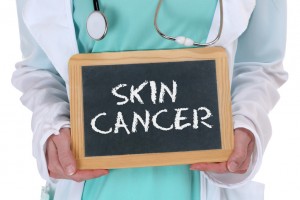May is Melanoma and Skin Cancer Awareness Month
Skin cancer is the most common type of cancer in the U.S. Recent studies show that the number of skin cancer cases is growing each year. According to the Centers for Disease Control and Prevention (CDC), nearly 5 million people are treated each year for skin cancer. Melanoma, the deadliest type of skin cancer, causes 9,000 deaths per year in the U.S.
 There are three major types of skin cancers: basal cell carcinoma, squamous cell carcinoma, and melanoma. Basal cell and squamous cell carcinomas are the most common. These cancers are unlikely to spread to other areas of the body. Melanoma is a highly aggressive cancer that spreads to other parts of the body. If not treated early, melanoma is deadly.
There are three major types of skin cancers: basal cell carcinoma, squamous cell carcinoma, and melanoma. Basal cell and squamous cell carcinomas are the most common. These cancers are unlikely to spread to other areas of the body. Melanoma is a highly aggressive cancer that spreads to other parts of the body. If not treated early, melanoma is deadly.
Skin cancer is caused by exposure to ultraviolet light, typically sunlight. The use of tanning beds also exposes the skin to ultraviolet light. People with fair skin, light hair, and blue or green eyes are most susceptible to developing skin cancer. It is important to protect the skin while outdoors, especially during peak sun hours between 10am and 4pm. Use a broad-spectrum sunscreen of at least SPF 15 on exposed skin. Reapply often, especially after swimming or sweating. Wear long pants, a long-sleeved shirt, and a hat to protect skin from sun exposure.
Basal cell carcinomas typically look like a raised, smooth, pearly bump. It may bleed frequently. It often appears as a sore that doesn’t heal. A squamous cell carcinomas appears as a well-defined red, scaly, thick bump. It may also bleed. Melanomas are usually brown, tan, black, or bluish pigmented lesions. They may also appear as a new mole that may itch or bleed. Any existing mole that changes size, shape, or color is suspicious. Melanomas are usually asymmetrical with irregular borders.
A healthcare professional should check any spot that may cause concern. Early detection is important for treating any skin cancer, but especially in melanoma. A primary care physician may refer the patient to a dermatologist for a biopsy. Treatment will depend on the type of skin cancer.




